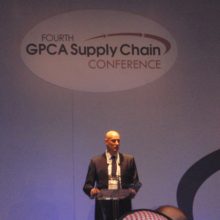
“The outlook is not good” Mr Elling continues. “Carriers are not leaving the ports at full capacity, the underlying issue is that supply outweighs demand severely. Prices of delivering a container via sea have not increased, if anything it’s got cheaper due to the raise in inflation. If we increase the rates it will only further reduce demand, so what do we do?”
“For the shareholders of shipping companies return on investment has been 2% over the past 7 years, which as you know, is the same as no-risk bank interest. What we need is stability in the supply and demand for the industry, in order to be profitable in the long term.”
“Shipping companies have lost a great deal of money over these years and some inevitably face collapse. The future ladies and gentleman is a concern. And how do we plan for the future? Growth was 8% a few years ago, its now 6%, so when you consider it takes 3 years to build a ship, you can see the difficulty we face.”
“Currently on average 1 in 2 containers do not reach customers on time, this is not the level of service we should be providing as an industry.”
“Here at Maersk we have introduced the ‘Daily Maersk’ concept to combat this issue. Daily Maersk has introduced daily cut offs from ports in Asia to ports in North Europe, whereas most other carriers today have only 2-3 weekly cuts off’s on average, meaning if you miss the cut off, the expense is a week delay rather than a day delay.”
“Daily Maersk was launched on the Asia to North Europe route 6 months ago, in the last 2 months 97% of containers reached customers on time, proving the concept is effective.
“I believe we can bring Daily Maersk to the Gulf Region, but the implementation is still years away due to factors such as the flexibility in customs systems and the handling procedures from various authorities in the region. But the potential is there, the shipping lanes run right by the region and the growth here will need it. The arrangement with daily cut offs will enable flexibility and the chance for customers to optimise their supply chain planning.”
Thomas Elling was following by a discussion from Abdullah Al-Mohanna, the Chief Executive Officer at National Chemical Carriers (NCC), who went on to further discuss issues faced by the industry. In summary he discussed the increased threat of piracy in the Gulf and the costs associated by it, such as insurance, protection, regulatory costs and the effect of banks pulling out of investments. He also discussed the rise in costs for the industry, “steel has gone up by 37% in recent years, I know of 6 companies in serious financial distress. We need to work together to combat these difficult times, collaboration is needed in order to survive.”

